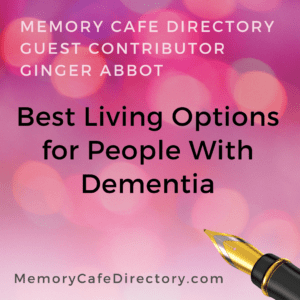Memory Cafe Directory posts and/or links to retailers can be advertising, sponsored, or affiliate links. We may earn a small commission from them. Thank you.
Best Living Options for People With Dementia
Submitted by Guest Contributor:
Ginger Abbot
If you love someone with dementia, the mere thought of changing their living arrangement might cause stress and panic for everyone involved. However, finding long-term residential care is relatively straightforward when you know what’s available. Once you understand your family member’s condition and which stage of dementia they’re in, you can consider better living options for them.
The first step simply requires that you educate yourself so you feel confident in your decision and ultimately make the best choice for your loved one.
Independent Living Community
Can people with dementia live on their own in an independent living community? If your loved one is able to take care of themself but is unable to drive, they can still live on their own. However, their arrangement might include an independent living community instead of a house or apartment. This kind of facility provides meals, private quarters, and opportunities for your loved one to attend social and recreational events.
This arrangement is perfect for dementia patients who may get lonely and experience rapid mental decline while living alone. That’s because interacting with others engages skills like memory, self-regulation, language, and interpersonal communication, all of which can slow decline and improve quality of life.
While Medicaid does cover some assisted living costs, it likely won’t cover your loved one’s stay in an independent living community. You’ll also have to relocate them to a facility that offers more comprehensive care as their condition progresses. Most residents don’t stay in independent communities for very long before moving on.
Low-Income Housing
If you or your loved one are unable to afford rent in an independent living community, low-income housing is a decent alternative. This option is best for those who can live autonomously or have a spouse to supervise their daily activities. However, people with mild to moderate dementia can also live in one of these homes. They’ll just need home care or family help with some tasks.
Low-income housing is similar to independent living communities in that many homes form small neighborhoods that cater specifically to older people. Look for communities that offer affordable housing for seniors or retired folk. Some even have on-site elevators, offices, libraries, and recreational facilities so your loved one doesn’t have to leave campus to meet new people or enjoy certain hobbies.
Adult Day-Care Programs
Though not technically a living facility, adult day-care programs offer your loved one similar opportunities to engage with others and sharpen mental skills. Like child-care programs, you’ll bring your family member to a place where they’re fed, cared for, and provided with stimulating activities. They’ll spend the majority of their day learning, laughing, and loving, so they’re a good supplement to respite care.
Many local communities have such programs, so look for a nearby center with attentive staff and engaging activities. Many programs require private funds, and Medicaid is unlikely to offer any coverage. However, you may find financial assistance in the form of loans and grants. Either way, taking your loved one to day care is likely more affordable than checking them into an assisted living facility.
Assisted Living Facility
Do people with dementia need an assisted living facility? If your loved one is generally independent but has trouble bathing, getting dressed, and running errands, they’d likely thrive in an assisted living facility. Assisted living offers an intermediate level of care for those with mild to moderate dementia, so staff will assist your loved ones with these and other routine tasks. These facilities also tend to offer a wide array of add-on services — like providing meals or extra help — at an additional cost.
There’s also a limit to how much help assisted living can provide. Rooms in assisted living facilities are private and staff is available to help with medical emergencies if need be. However, they aren’t equipped to provide 24/7 one-on-one care, nor can they police behaviors like outbursts and wandering around the facility. These dementia symptoms are usually a sign that it’s time to move to a higher level of care.
Continuing Care Retirement Community
Unlike most other facilities on this list, continuing care retirement communities (CCRC) offer a tiered approach to care, making them one of the best living options for people with dementia. Whether your loved one is struggling with a new diagnosis or battling severe dementia, they can find joy and meaning in one of these communities. Here, individuals who’re able to live independently can do so. Then, as their condition deteriorates, they’ll move to a higher care level within the same facility.
Of course, this option is beneficial because your family member won’t have to move very far or leave their friends behind. The patient can also bring their spouse along so they can live together, regardless of what kind of care they need. However, it’s important to note that, while Medicaid may cover lower-level care, it might not offer financial assistance for higher-level services. Therefore, it’s important to plan ahead and budget accordingly.
Adult Family Homes
If your loved one resists moving to a large assisted living facility, an adult family home may be an excellent alternative. This living arrangement is ideal for those with mild to moderate dementia because, like a CCRC, it offers continuing care to assist patients as their condition progresses. They’re also smaller and house about six patients who interact with each other and one or two care providers. Here, your loved one will enjoy life in a typical residential home where they’ll likely feel more comfortable receiving one-on-one care.
Look for adult family homes — also called board and care homes — that have received licensing and maintain best practices to keep both staff and residents happy and safe. You might also find one that offers occasional medical care in case of emergencies. However, it’s important to remember that Medicaid likely won’t cover these services. Thus, if your loved one is in the end stages of dementia and requires more care, a nursing home might be the best living option for them.
Nursing Home
When a dementia patient deteriorates to the point of needing 24/7 care, a nursing home is often the best place for them. These facilities can provide a high level of medical care and are often organized like hospitals. The nursing staff members have varying levels of medical training so they can administer medication, injections, IVs, and wound care, unlike the facilities above. They also provide around-the-clock supervision so patients remain on-campus and don’t wander off.
Ultimately, a nursing home allows your loved one to maintain their quality of life for as long as possible and receive whatever assistance they need. Unless there are other serious medical issues present, patients are usually in the later stages of dementia when they move into one of these facilities. Luckily, Medicaid covers this living arrangement for those suffering from severe dementia, so you won’t have to worry about paying for intensive care.
Choosing the Best Fit
Choosing the best living option for a dementia patient is tricky, to say the least. However, you must have a plan in place when the time comes, so it’s wise to find a facility sooner rather than later.
Do a quick Google search to find options in your area. Then, take a few tours, ask lots of questions, and finalize a budget. The national median rates for assisted living services total $4,000 per month, so review insurance coverage and plan accordingly. Remember that your loved one might have to move several times, so try to stay flexible and keep an open mind. Some of the best options are the least traditional, so explore all your options.
About the Author: Ginger Abbot

Ginger Abbot
Ginger Abbot is a career and lifestyle writer.
Read more of her work on the learning publication Classrooms.
Become a Contributor!
 Do you want to be a Memory Cafe Directory contributor? If you have helpful information to share with our community, read about the guidelines, then get in touch to discuss what you have to offer.
Do you want to be a Memory Cafe Directory contributor? If you have helpful information to share with our community, read about the guidelines, then get in touch to discuss what you have to offer.
Thank you.




